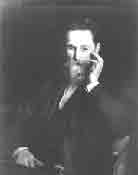Joseph Pulitzer

(1847 - 1911)
Joseph Pulitzer, the son of a grain dealer, was born
in Makdo, near Budapest, in
the Austro-Hungarian Empire in April 1847. He emigrated to the United
States in 1864 and settled in St. Louis. He worked as a mule tender,
waiter and hack driver before studying English at the Mercantile Library.
In 1868 Pulitzer was recruited by Carl Schurz for his German-language
daily, the Westliche Post.
Pulitzer joined the Republican Party and was elected
to the Missouri State Assembly. In 1872 he, like many Radical Republicans,
supported Horace Greeley against Ulysses S. Grant, the official Republican
candidate. Despite the efforts of Pulitzer and Carl Schurz in Missouri,
Grant won the presidential election by 286 electoral votes to 66.
In 1872 Pulitzer was able to purchase the St. Louis
Post for $3,000. This venture was a success and six years later was
able to buy the St. Louis Dispatch for $2,700. He combined the two newspapers
and launched crusades against government corruption, lotteries, gambling,
and tax fraud.
By 1883 Pulitzer was a wealthy man and was able to
purchase the New York World for $346,000. The newspaper, which had been
losing $40,000 a year, was turned into a journal that concentrated on
human-interest stories, scandal and sensational material. Pulitzer also
promised to use the paper to "expose all fraud and sham, fight
all public evils and abuses, and to battle for the people with earnest
sincerity".
Pulitzer also used the New York World to advocate a
ten-point program of reform: tax luxuries, tax inheritances; tax large
incomes; tax monopolies; tax the privileged corporations; institute
a tariff for revenue; reform the civil service; punish corrupt office
holders; punish vote buying; punish employers who coerce their employees
in elections. crusades against lotteries, gambling, and tax fraud.
Two years after Pulitzer purchased New York World in
1883, he recruited Richard F. Outcault as one of his artists. Outcault's
comic cartoons based on life in the slums were extremely popular with
the readers and sales reached 600,000, making it the largest circulating
newspaper in the country. About the same time, Pulitzer was elected
as a Democrat to the forty-ninth Congress and served from March 4, 1885,
until April 10, 1886, when he resigned.
In 1887 Pulitzer recruited Nellie Bly, a journalist
working for the Pittsburgh Dispatch. Over the next few years she pioneered
the idea of investigative reporting by writing articles about poverty,
housing and labour conditions in New York. This often involved undercover
work and feigned insanity to get into the insane asylum on Blackwell's
Island. Her scathing attack on the way patients were treated led to
much needed reforms.
After reading Jules Verne's Around the World in Eighty
Days in 1889, Nellie Bly suggested to Pulitzer that the New York World
should finance an attempt to break the record illustrated in the book.
Pulitzer agreed and held a competition which involved guessing the time
it would take Bly to circle the globe. Over 1,000,000 people entered
the contest and when she arrived back in New York she was met by a massive
crowd to see her break the record in 72 days, 6 hours, 11 minutes and
14 seconds.
In 1890 Pulitzer withdrew from the editorship of the
New York World. Although only 43, Pulitzer was now virtually blind and
for the rest of his life he was unable to return to the newsroom. However,
he continued to manage the editorial and business direction of his newspapers.
In 1896 the New York World began producing a colour
supplement, Richard F. Outcault created a new young character that wore
a yellow nightshirt. Known as the Yellow Kid, this cartoon became so
popular that William Randolph Hearst, owner of the New York Journal,
offered him a considerable amount of money to join his newspaper. Pulitzer
now employed George Luks to produce the Yellow Kid.
Hearst also reduced the price of the New York Journal
to one cent and including colour magazine sections. Pulitzer's New York
World and Hearst's New York Journal became involved in a circulation
war, and their use of promotional schemes and sensational stories became
known as yellow journalism.
Pulitzer continued to promote investigative reporting
and in 1909 the New York World exposed a fraudulent payment of $40 million
by the United States to the French Panama Canal Company. The federal
government indicted Pulitzer for criminally libeling President Theodore
Roosevelt and the banker John Pierpont Morgan. However, Pulitzer won
an important victory for the freedom of the press when the courts dismissed
the indictments.
Joseph Pulitzer, whose eyesight deteriorated rapidly
during his later years, died in 1911 aboard his yacht in the harbor
of Charleston, S.C.. In his will left $2 million for the establishment
of a school of journalism at Columbia University. He also left a fund
that established annual prizes for literature, drama, music and journalism.
Since 1922 Pulitzer Prizes have also been awarded to cartoonists.
Sources: Spartacus
Educational; Biographical
Directory of the United States Congress Photo Hancock
Public Library |